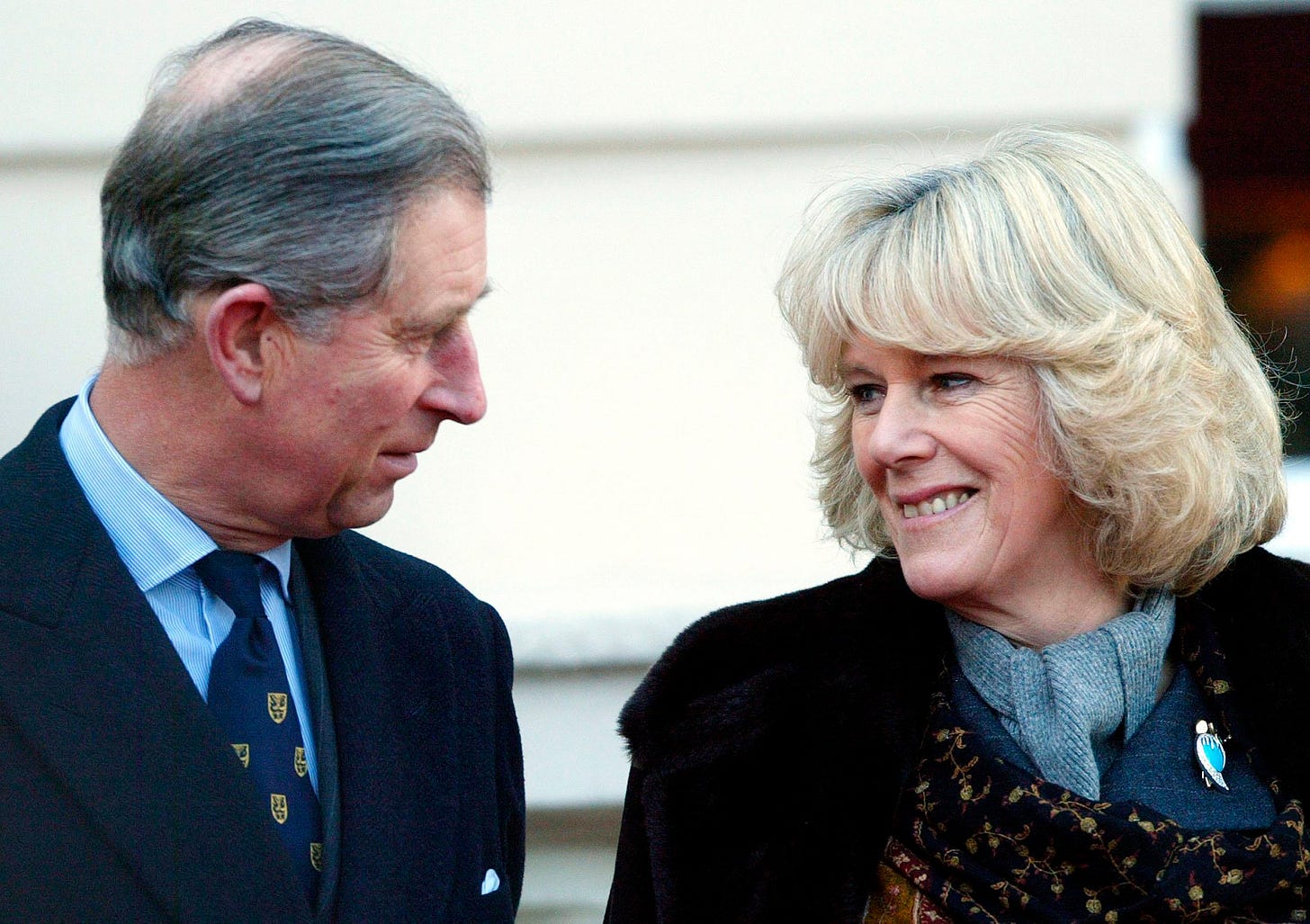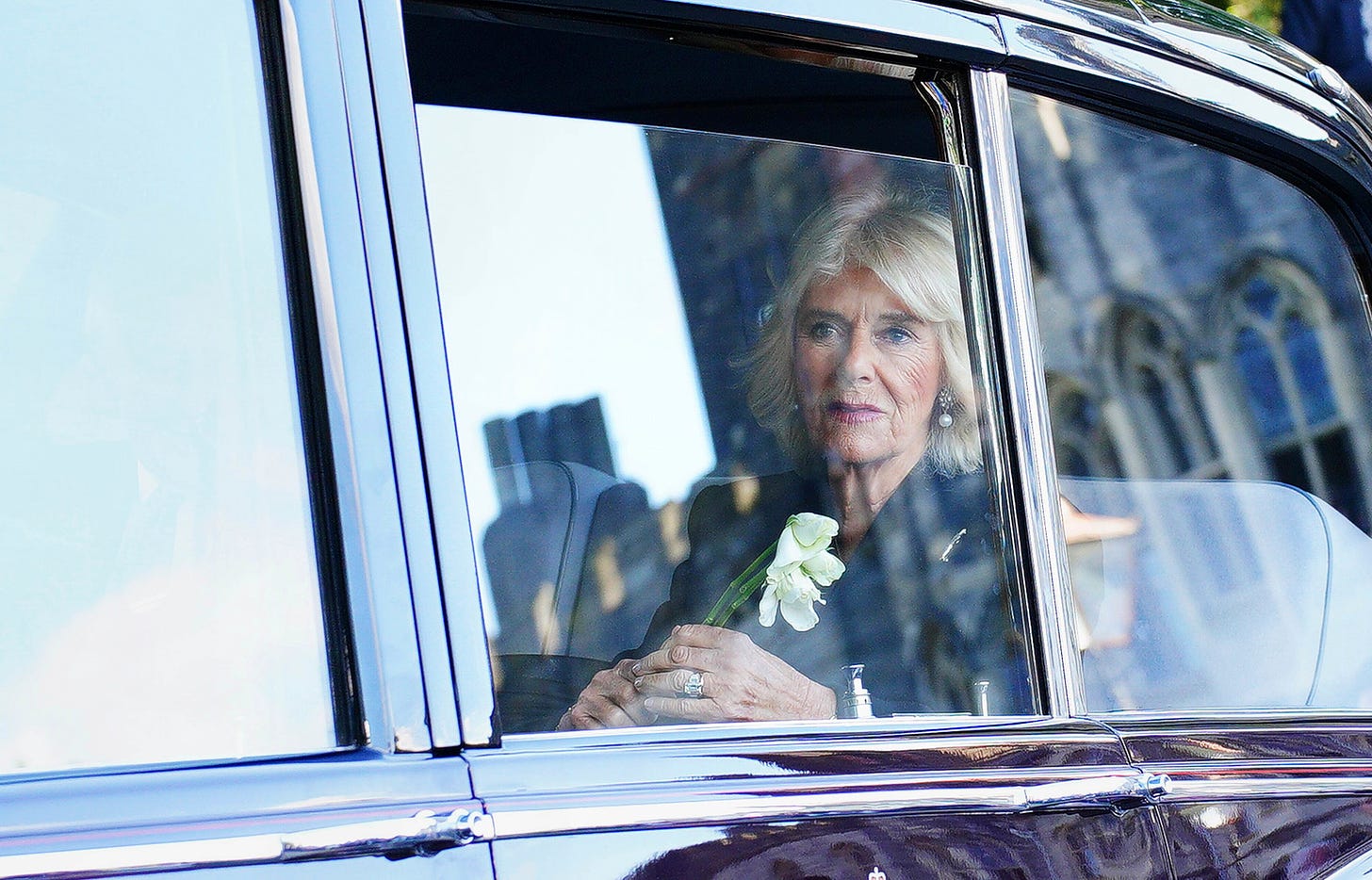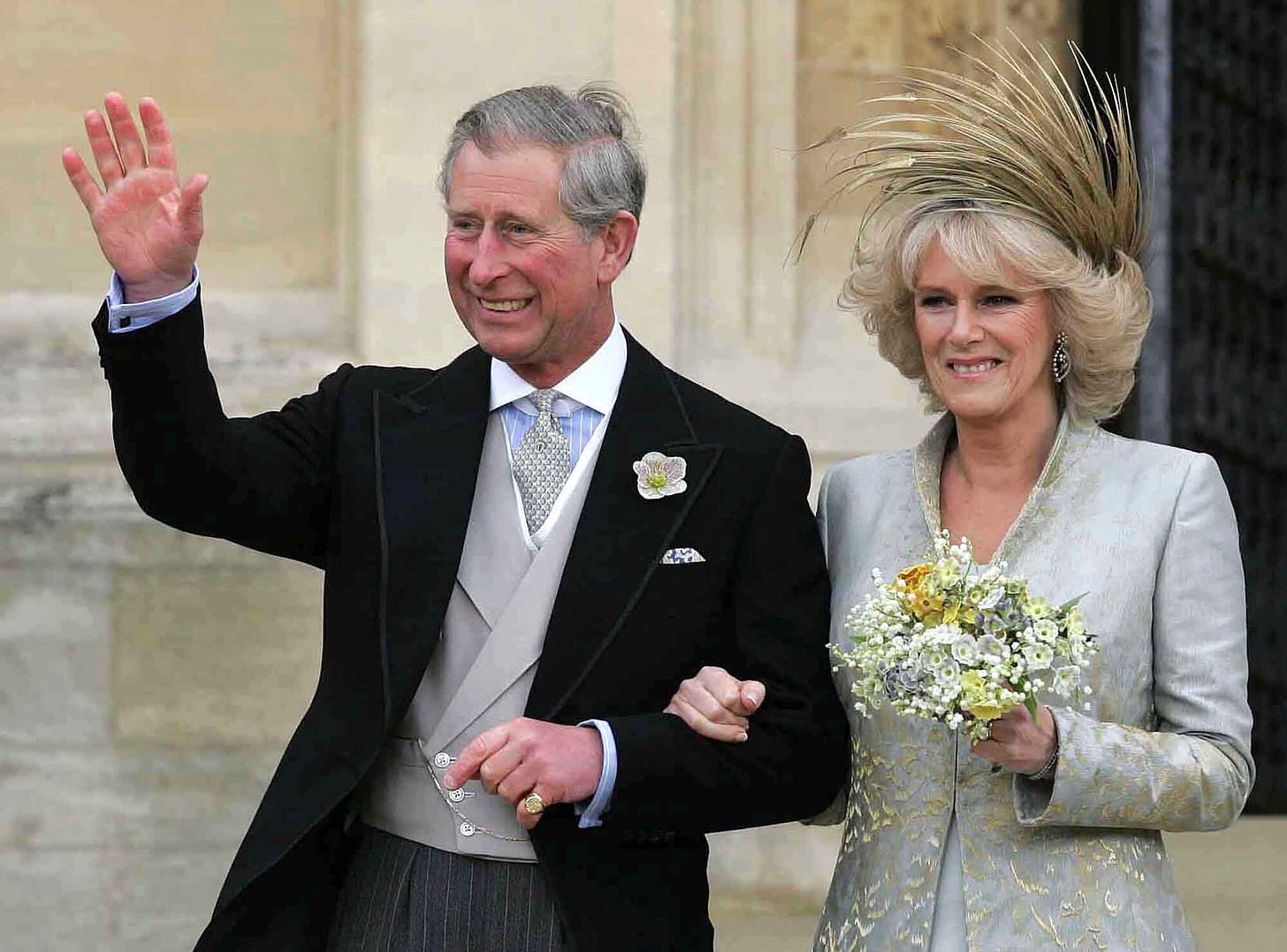Original link: https://sehseh.substack.com/p/feb
?Official website good read version|Yan Jiyu column: After the Queen left, Britain had Queen Camilla
“When the time is right. My son Charlie will be king, and I know you will support him and his wife Camilla as much as you support me. I also sincerely hope that when that time comes, Camilla will be called Continue to render her loyal service to the Queen.”
–Queen Elizabeth II
At 6:30 p.m. on September 8, 2022, Buckingham Palace (Buckingham Palace) announced that Queen Elizabeth II had died, and the crown prince succeeded to the new king Charles III (Charles III). The British national anthem was changed from “God Save the Queen” to “God Save the King”, but God also added a new “Queen” for Britain: Queen Camilla.
Camilla and Charlie have known each other for more than half a century, and the two dated on and off. They got married in 2005 and have been in love for 17 years. In early February this year, the Queen issued a statement on the eve of the “Platinum Jubilee” celebrating the 70th anniversary of her accession to the throne, specifically mentioning: “When the time is right. My son Charlie will become king, and I know you will support him and him. my wife, Camilla, as I do. It is my sincere hope that when that time comes, Camilla will be called Queen and continue to serve her faithfully.”
The Prince of Wales ascended the throne, and the princess was promoted to the Queen Consort. It was a matter of course, so why did the Queen have to make arrangements and instruct her before her death? The reason is that Camilla was once called “the most unpopular woman in the UK” and “the destroyer of the love fairy tale of prince and princess”.
There is no denying that Camilla played the “little three” between Charlie and Diana (Diana Spencer) as a married woman for a long time when she was young. Charlie and Diana divorced in August 1996, and Diana died in a car accident a year later. Camilla was once reduced to a sinner of the nation that was seen by ten eyes and pointed by ten hands.
When she married Charlie in April 2005, although her image had rebounded from the bottom, she still had to avoid the title of “Princess of Wales” and could only succumb to the “Duchess of Cornwall”. )”; since the former is the title of Diana, Camilla cannot overstep it.
The bigger sacrifice was when Camilla promised that when Charlie became king, she would not be called “Queen”, but “Princess Consort”. This is unprecedented in British history, and it also makes Charlie brooding. The Queen must come forward to finalize the decision and return to the right track of history.
The World Walk has important stories you haven’t read yet. We focus on global issues from a gender perspective, complementing stories of dilemma, breakthrough, connection, and change that traditional power perspectives ignore.
Please pay a subscription to become our partner and walk with women around the world.
She was ‘the most unpopular woman in the UK’
Camilla was born on July 17, 1947. Her father was a wealthy wine merchant and her mother was from a noble family. From her family background to her education, Camilla is a typical British upper-class woman. She has studied in Switzerland and France. She was one of the 311 “debutantes” in London in 1965. She likes to read, ride horses, and paint. Friends in her early years described her as “strong, charming, confident, smart and lively”.
In 1970, Camilla met Charlie, who was 1 year and 4 months younger than her. Charlie likes to play polo, and Camilla will be there to cheer. At the beginning of 1973, Charlie traveled abroad as an officer of the Royal Navy. He was gone for 8 months. After returning, the two not only did not have a new marriage, but their relationship ended abruptly. As for the reason, there are different opinions. It may be that the young lack of thought, the elders have other arrangements, or the courtiers are interfering.
In July 1973, Camilla married Andrew Parker Bowles, an Army officer who had also been dating on and off for many years (Bowles had pursued Charlie’s sister Princess Anne). Still maintain friendship. Six years later, the royal family suffered great changes. Charlie’s uncle, Lord Mountbatten, was killed by the terrorist organization, the Irish Republican Army. Charlie, who was very close to him, was hit hard and sought comfort from Camilla. Pauls obviously knew about it, but he was sexually provocative, and he didn’t care about his wife Hong Xing getting out of the wall.
At this time, Charles had begun to interact with Diana. As the first in line to the British throne and over 30 years old, the pressure to marry and start a family was increasing. In February 1981, Charlie proposed to Diana, who was 12 and a half years younger than him, and the popular “Wedding of the Century” debuted in July of the same year. But the dream of the wedding often only makes the disintegration of the marriage more cruel. By 1986, Charlie and Diana were destined to be unable to overcome the disparity in temperament, concept, interest and age. The two developed extramarital affairs. Charlie’s mistress was still Camilla, his confidante for more than ten years.
In an interview in 1995, Diana said plaintively: “This marriage is a threesome, so it’s a little crowded.” Camilla, who accused herself of being married, was her and Charlie’s third party from the very beginning, calling her “Love.” Weiner (Rottweiler, a large German dog)”. The British gossip newspaper, which is the best in the world for digging celebrities’ privacy skills, is ubiquitous, turning the royal affair into an open-air soap opera and wild stage show. Diana is scarred by her marriage (depression, bulimia, self-mutilation), and Camilla (and Charlie) are brought to the court of public opinion for a harsh trial.
After a major trial, the relationship has become deeper and firmer
From 1995 to 1996, the marriage of Camilla and Charlie came to an end. But in August 1997, the much-loved Diana died suddenly in a car accident, and the royal family responded slowly and numbly, arousing public outrage in the British society, not only Charlie and Camilla, but also the Queen’s image was seriously damaged.
“What do we want such a royal family to do?” became the question of many people. Fortunately, Charlie immediately carried out damage control and arranged for the Queen to personally come forward as the “grandmother of the two little princes” to praise Princess Di and to appease people’s hearts, which finally turned public opinion.
After this major trial, Charlie and Camilla’s relationship has grown stronger and stronger. After all, both of them are middle-aged and know what kind of “wife” they need. Charlie hired public relations expert Mark Bolland as his deputy private secretary, devised a media strategy, rebuilt the public image of himself and Camilla, and gradually made the British public accept their emotions, and the results were remarkable. Of course, Camilla’s low-key, cautious and down-to-earth style, loyalty to the royal family, and investment in social welfare such as osteoporosis prevention and helping victims of sexual assault have also played a very important role.
In January 1999, Charlie and Camilla attended a public event together for the first time and appeared at The Ritz London; in June 2000, the Queen officially received (accepted) Camilla, and the British media did it quite positively ‘s report, Camilla can finally get rid of the embarrassing associative word “mistress”. In 2002, Camilla joined key members of the royal family at the “Golden Jubilee” celebrations of the Queen’s 50th year on the throne; in 2003, she moved into Clarence House, Charlie’s official residence.
For Diana’s orphans, Prince William and Prince Harry, Camilla apparently worked hard and paid off. Harry emphasized in an interview in 2005 that Camilla was definitely not the “evil stepmother” of fairy tales, “she was a beautiful woman who made our father very, very happy, more than anything else. William loved her very much.”
After 2004, almost all of Charlie’s public events have seen Camilla’s figure, and polls also show that public opinion is happy to see the two get married. But there is one more hurdle: Charlie will also be the supreme leader of the Church of England when he ascends the throne, and Church conservatives may oppose him marrying a “divorced woman with a living ex-husband”, recalls Edward VIII (Edward VIII, The Duke of Windsor) and Lady Simpson (Wallis Simpson), it is not difficult to understand the sensitivity of the matter.
Fortunately, British society in the 21st century has grown a bit, and this discriminatory shackle against women is a thing of the past. After years of painstaking efforts by Charlie and Camilla, the Queen, then Prime Minister Tony Blair, and Archbishop of Canterbury (Archbishop of Canterbury) Williams (Rowan Williams) unanimously approved their marriage.
In February 2005, when Charlie and Camilla announced their engagement, Clarence House received more than 23,000 letters of congratulations (although there were nearly 1,000 letters of protest and condemnation). On April 9, the wedding was held in a low-key manner at Windsor Guildhall. The bride and groom were over fifty years old, but it was still touching to have a lover who was married.
“I transcend it and live in peace with it”
Years later, Camilla looked back at those years when she lived under the spotlight of the media: “It was very hard. I was scrutinized by the media for so long, and I just had to find a way to accept it. No one likes to be watched all the time and encountered. Criticism of all kinds…but in the end, I transcended it and lived with it peacefully.”
It must be mentioned that Camilla’s great-grandmother, Alice Keppel, was once the mistress of Charles’s great-grandfather, Edward VII. The contrast between the two generations of men and women is reminiscent of the 1980 Hollywood romance “Somewhere in Time”.
The world is sunny at night. The years after Charlie and Camilla’s marriage have been even better; in private, the couple’s relationship has become stronger; in public, they have been forgiven, supported and even loved by the British people. By the time the Queen’s Platinum Jubilee Announcement was released, it was all set, and the British knew and accepted that after the Queen is gone, they will have a Queen. (Finish)
About the author| Yan Jiyu (Master of the Institute of Chinese Literature, National Taiwan University, has long been engaged in interdisciplinary translation and international news reporting and commentary work, and is currently the executive deputy editor-in-chief of “Wind Media”.)
Subscribe to the Walk Around Newsletter and we’ll deliver:
[Members only] Go original: a good story that others have not written yet
An Evening News Every Day: A selection of daily news summaries for you
Weekly Newsletter: Good articles from around the world that you may have missed
A Weekly Note: A Weekly Guide to Online Activities
【Exclusive benefits for other members】» See here
This article is reprinted from: https://sehseh.substack.com/p/feb
This site is for inclusion only, and the copyright belongs to the original author.


